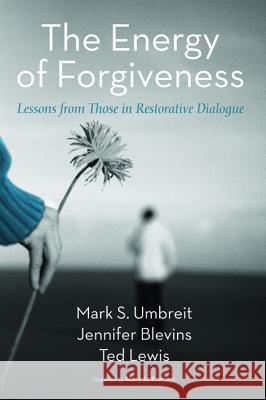The Energy of Forgiveness » książka
The Energy of Forgiveness
ISBN-13: 9781625644237 / Angielski / Miękka / 2015 / 150 str.
The Energy of Forgiveness
ISBN-13: 9781625644237 / Angielski / Miękka / 2015 / 150 str.
(netto: 82,50 VAT: 5%)
Najniższa cena z 30 dni: 82,47
ok. 16-18 dni roboczych.
Darmowa dostawa!
Forgiveness is a profound, life-changing experience for many people who have been hurt by others. But forgiveness is paradoxical in that if one relies on forgiveness language or if others prescribe it as an expectation, the depth of that experience can be significantly compromised. By the same token, many people experience deep forgiveness without ever using the language of forgiveness. Most of the stories in this book testify to how forgiveness is experienced primarily as an inner unburdening of negative emotions, a process that is aided by safe, facilitated dialogue with the offending party. New research on the benefits of forgiveness is on the rise these days, yet there is often little narrative to show the power of forgiveness. The authors present more than twelve case studies that led up to restorative dialogue processes where parties chose to meet together. Whether the case involves the murder of a loved one, a burglary, or the buildup of workplace tensions, a common pattern emerges: as both parties encounter the true humanity of the other person, the negative energy stemming from the offense is transformed into a positive energy that gives both parties a deep inner peace and new freedom. ""Mark Umbreit, Jennifer Blevins, and Ted Lewis draw on decades of observing restorative dialogues and identify a paradox: the more people feel pressured to forgive, the less likely they will forgive. When people are inclined toward forgiving, the less said about it, the better. That can--for those people--create authentic forgiveness, a release of toxic energy. This is an important personal book of personal stories with a fresh perspective on forgiveness within restorative dialogues."" --Everett L. Worthington Jr., author of Forgiving and Reconciling ""Mark Umbreit's book is a gift to peacemakers everywhere. For four decades, he has experienced the profound and miraculous energy of forgiveness as it has been brought forth from within the thorny group situations he has worked in--in his circles, the human heart is healed and revealed, and something that was broken is made whole."" --Mary Hayes Grieco, author of Unconditional Forgiveness Mark Umbreit is Professor of Social Work at the University of Minnesota, Director of the Center for Restorative Justice & Peacemaking (CRJP), on the faculty of the Center for Spirituality & Healing, and author of numerous books. Jennifer Blevins is a PhD candidate, part of the community faculty of Social Work at the University of Minnesota, and researcher for CRJP. Ted Lewis is Communications Director for CRJP. Since 1996 he has worked as a restorative justice mediator, trainer, program manager, and consultant.
Forgiveness is a profound, life-changing experience for many people who have been hurt by others. But forgiveness is paradoxical in that if one relies on forgiveness language or if others prescribe it as an expectation, the depth of that experience can be significantly compromised. By the same token, many people experience deep forgiveness without ever using the language of forgiveness. Most of the stories in this book testify to how forgiveness is experienced primarily as an inner unburdening of negative emotions, a process that is aided by safe, facilitated dialogue with the offending party. New research on the benefits of forgiveness is on the rise these days, yet there is often little narrative to show the power of forgiveness. The authors present more than twelve case studies that led up to restorative dialogue processes where parties chose to meet together. Whether the case involves the murder of a loved one, a burglary, or the buildup of workplace tensions, a common pattern emerges: as both parties encounter the true humanity of the other person, the negative energy stemming from the offense is transformed into a positive energy that gives both parties a deep inner peace and new freedom.""Mark Umbreit, Jennifer Blevins, and Ted Lewis draw on decades of observing restorative dialogues and identify a paradox: the more people feel pressured to forgive, the less likely they will forgive. When people are inclined toward forgiving, the less said about it, the better. That can--for those people--create authentic forgiveness, a release of toxic energy. This is an important personal book of personal stories with a fresh perspective on forgiveness within restorative dialogues.""--Everett L. Worthington Jr., author of Forgiving and Reconciling""Mark Umbreits book is a gift to peacemakers everywhere. For four decades, he has experienced the profound and miraculous energy of forgiveness as it has been brought forth from within the thorny group situations he has worked in--in his circles, the human heart is healed and revealed, and something that was broken is made whole.""--Mary Hayes Grieco, author of Unconditional ForgivenessMark Umbreit is Professor of Social Work at the University of Minnesota, Director of the Center for Restorative Justice & Peacemaking (CRJP), on the faculty of the Center for Spirituality & Healing, and author of numerous books.Jennifer Blevins is a PhD candidate, part of the community faculty of Social Work at the University of Minnesota, and researcher for CRJP. Ted Lewis is Communications Director for CRJP. Since 1996 he has worked as a restorative justice mediator, trainer, program manager, and consultant.











